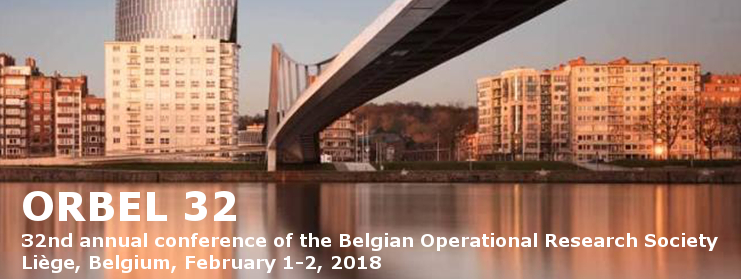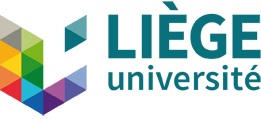 |
| |

|
|
| |
|
Schedule
Click on a link for more details
Show all the abstracts
Download the booklet of abtracts
Thursday 11:00 - 12:20 Routing Problems
Room 138 - Chair: Pieter Vansteenwegen
Thursday 11:00 - 12:20 Emergency operations scheduling
Room 130 - Chair: El-Houssaine Aghezzaf
Thursday 11:00 - 12:20 Algorithm design
Room 126 - Chair: Gerrit Janssens
Thursday 11:00 - 12:20 Multiple Objectives
Room 120 - Chair: Filip Van Utterbeeck
Thursday 13:30 - 14:50 Integrated logistics
Room 138 - Chair: Kris Braekers
Thursday 13:30 - 14:50 Person transportation
Room 130 - Chair: Célia Paquay
Thursday 13:30 - 14:50 Continuous models
Room 126 - Chair: Nicolas Gillis
Thursday 13:30 - 14:50 Integer programming
Room 120 - Chair: Bernard Fortz
Thursday 15:20 - 16:20 Material handling and warehousing 1
Room 138 - Chair: Greet Vanden Berghe
Thursday 15:20 - 16:20 Operations management
Room 130 - Chair: Roel Leus
Thursday 15:20 - 16:20 Matrix factorization
Room 126 - Chair: Pierre Kunsch
Thursday 16:30 - 17:10 Material handling and warehousing 2
Room 138 - Chair: Katrien Ramaekers
Thursday 16:30 - 17:10 Routing and local search
Room 130 - Chair: An Caris
Thursday 16:30 - 17:10 Traffic management
Room 126 - Chair: Joris Walraevens
Thursday 16:30 - 17:10 Pharmaceutical supply chains
Room 120 - Chair: Bart Smeulders
Friday 10:50 - 12:10 Optimization in health care
Room 138 - Chair: Jeroen Beliën
- Staff Scheduling at a Medical Emergency Service: a case study at Instituto Nacional de Emergência Médica
Hendrik Vermuyten (KU Leuven, Campus Brussels)
Co-authors: Joana Namorado Rosa; Inês Marques; Jeroen Beliën; Ana Barbosa-Póvoa
Abstract:
This presentation addresses a real-life personnel scheduling problem at a medical emergency service. In a first step, the problem is formulated as an integer program. However, the problem turns out to be too complex for a commercial IP solver for realistic problem instances. For this reason, two heuristics are developed, namely a diving heuristic and a variable neighbourhood decomposition search (VNDS) heuristic. The diving heuristic reformulates the problem by decomposing on the staff members. The LP relaxation is then solved using column generation. After the column generation phase has finished, integer solutions are found by heuristically branching on all variables with a value above a certain threshold until the schedule has been fixed for each staff member. Additionally, two different column generation schemes are compared. The VNDS heuristic consists of a local search phase and a shake phase. The local search phase uses the principles of fix-and-optimise in combination with different neighbourhoods to iteratively improve the current solution. After a fixed number of iterations without improvement, the search moves to the shake phase in which the solution is randomly changed to allow the heuristic to escape local optima and to diversify the search.
The performance of both heuristics is tested on a real-life case study at Instituto Nacional de Emerg\^{e}ncia M\'{e}dica (INEM) as well as nineteen additional problem instances of varying dimensions. Four of these instances are derived from the INEM dataset by changing one of the problem dimensions, while an instance generator was built to construct the fifteen other instances. Results show that the VNDS heuristic clearly outperforms both diving heuristic implementations and a state-of-the-art commercial IP solver. In only hour of computation time, it finds good solutions with an average optimality gap of only 4.76 percent over all instances. The solutions proposed by the VNDS are then compared with the actual schedule implemented by INEM. To facilitate this comparison, the heuristic is implemented in a scheduling tool with an attractive graphical user interface. For six choices of objective function weights, which put different emphases on the relative importance of the various soft constraints, schedules are constructed by the VNDS. Each of the six schedules is compared with the actual schedule implemented by INEM and evaluated on eight key performance indicators (KPIs). All proposed schedules outperform the real schedule. Finally, two what-if scenarios are analysed to illustrate the impact of managerial decisions on the quality of the schedules and the resulting employee satisfaction.
- Home chemotherapy: optimizing the production and administration of drugs.
Véronique François (HEC Liège - Management School of the University of Liège)
Co-authors: Yasemin Arda, Diego Cattaruzza, Maxime Ogier
- An analysis of short term objectives for dynamic patient admission scheduling
Yi-hang Zhu (KU Leuven)
Co-authors: Túlio A. M. Toffolo, Wim Vancroonenburg, Greet Vanden Berghe
- Robust Kidney Exchange Programs
Bart Smeulders (HEC Liège - Management School of the University of Liège)
Co-authors: Yves Crama, Frits C.R. Spieksma
Friday 10:50 - 12:10 Network design
Room 130 - Chair: Jean-Sébastien Tancrez
Friday 10:50 - 12:10 Local search methodology
Room 126 - Chair: Patrick De Causmaecker
Friday 10:50 - 12:10 ORBEL Award
Room 120 - Chair: Frits Spieksma
Friday 13:00 - 14:00 Production and inventory management
Room 138 - Chair: Tony Wauters
Friday 13:00 - 14:00 Logistics 4.0
Room 130 - Chair: Thierry Pironet
Friday 13:00 - 14:00 Data clustering
Room 126 - Chair: Yves De Smet
Friday 13:00 - 14:00 Collective decision making
Room 120 - Chair: Bernard De Baets
Friday 14:10 - 15:10 Sport scheduling
Room 138 - Chair: Dries Goossens
Friday 14:10 - 15:10 Discrete choice modeling
Room 130 - Chair: Virginie Lurkin
Friday 14:10 - 15:10 Data classification
Room 126 - Chair: Ashwin Ittoo
|
|
| |
ORBEL - Conference chair: Prof. A. Arda -
Platform: Prof. M. Schyns.
|
|
 |
|





